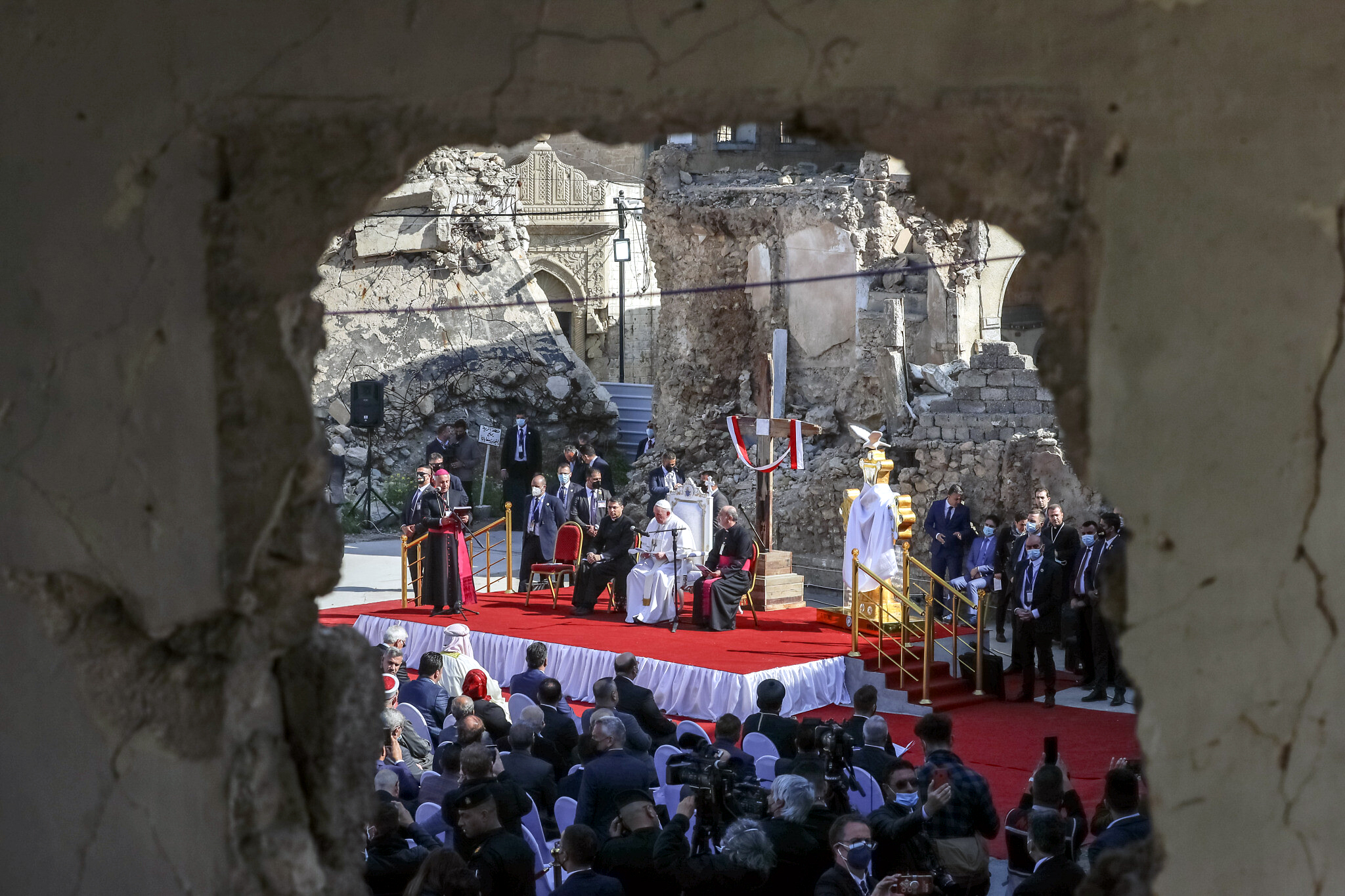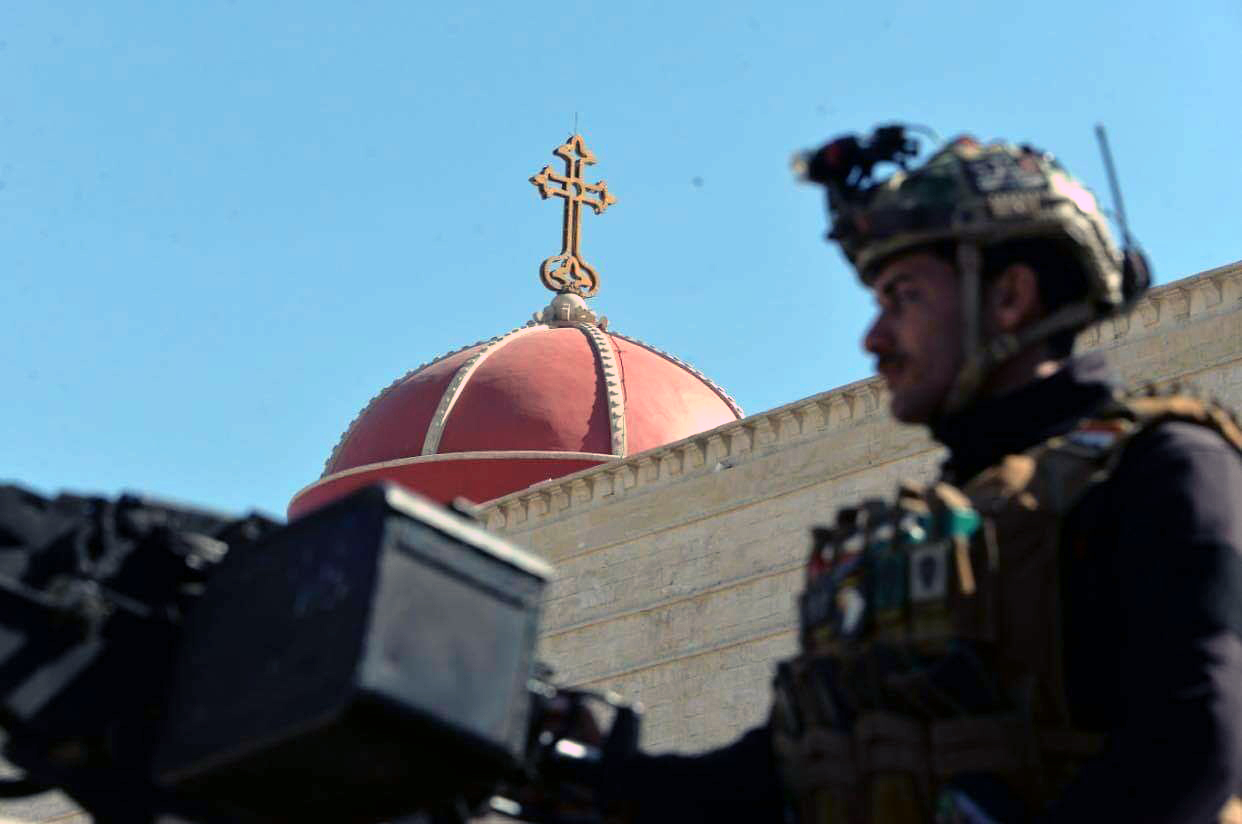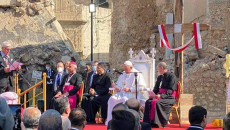A year has passed since Pope Francis' visit to Nineveh Province, and there is no tangible change on the ground, according to what clerics and politicians confirm, indicating that the conditions of Christians are still "bad."
In March 2021, Pope Francis paid a 4-day visit to Iraq, which was the first ever papal visit to the country, as part of an initiative to preserve the ancient Christian communities in Iraq, amid security measures and strict official and popular preparations.
On the first ever papal visit to Iraq & his first international trip since the start of the corona virus pandemic, the pontiff has landed in Baghdad on March 5th and left on March 8th.
He has met Iraq's senior Shia Muslim cleric Ali al-Sistani in Najaf, led an inter-religious dialogue in Ur, home of prophet Abraham, met the Christian community in the Nineveh plains and finally led a mass prayer in Erbil stadium.
On March 7th, the Pontiff recited a prayer of sufferage for the victims of war at the ruins of the Syriac Catholic Church of Hosh al-Bieaa (Church Square).
The Pope's visit gained great importance and received great expectations and results, especially from the people of Nineveh Province, who hoped that this visit would contribute to drawing the attention of the international community to their problems and the extent of the destruction caused by the extremist militants of the Islamic State of Iraq and Syria ISIS from 2014 throughout 2017.
The situation of Nineveh is still unstable... and migration continues
The Christian cleric Khoury Qiran, from the Nineveh Plains home to the Christian community, confirms that, although the Pope’s visit gave hope, the emigration is still taking place. The situation in the Nineveh Plains is still unstable, and Christian citizens cannot stand it. That is why we are witnessing continuous emigration cases.
"Iraq is a country that accommodates everyone, but the problem is that some extremist parties do not want to unite ranks to build a bridge to a new future for the next generation," Qiran said
"The government is not prioritizing the situation of Christians, and we expected that the Pope's visit would be a step towards drawing attention, more attention and services, and compensating those affected by terrorist operations, but this did not happen."
The governor of Nineveh, Najm al-Jubouri, had announced earlier that a number of countries had offered to help rebuild Mosul after Pope Francis' visit, and the Tourism Committee revealed preparations to change the reality of archeological sites.
Pope expressed his sadness for the brutal tragedy Nineveh, cradle of humanity, faced. He called on the locals to return home and reconstruct their hundred years hometowns.
Almost four years following the declaration of ISIS defeat by the Iraqi government in 2017, large parts of Mosul, center of Ninewa province, mainly the Old City, still lie largely in ruins, due to poor funding, chronic mismanagement, corruption and political disputes.
The situation of Christians is still very bad, as their lands are still being stolen
The former deputy in the Iraqi parliament, Joseph Silewa, points out that the Pope's visit to Iraq should have taken place in coordination with the components that live in the country.
"Nothing has changed a year after the Pope's visit to Iraq, except that a group of roads were paved, sidewalks were painted and trees were planted," Silewa said.
"The conditions of Christians are still very bad, as their lands are still stolen and Kurdish, Sunni and Shiite agendas are still being imposed on them, and racist laws are being imposed on them."
He stressed that "the so-called peaceful coexistence is a lie and an attempt to beautify the country's image. The lives of all the Iraqi people and the Christian component are still in danger, and the Pope's visit was in order to give legitimacy to the authorities in Baghdad and Erbil to continue the oppression and tyranny practiced against the people."

. Ninewa, 7 March 2021- Pope Francis leads prayer among the ruins of Syriac Catholic Square Church (Hosh al-Baia) in old Mosul. AP
On March 7th, Pope Francis flew to Qaraqosh (Bakhdida), center of al-Hamdaniyah district, ancient home of Christian locals, where he paid a visit to the Qaraqosh community at the Church of the Immaculate Conception where he opened the closed doors of the church tidied and ornamented for his apostolic long-awaited visit.
Between June 2014 and July 2017 Mosul was occupied by the Islamic State IS. An estimated half a million people, including more than 120,000 Christians, fled from Mosul, center of Nineveh province.
Two decades ago, Iraq was home for over 1.5 million Christians, 3% of Iraq's population falling to 800,000 in 2003 following gulf war. They were mainly based in the provinces of Baghdad, Nineveh, Duhok, Kirkuk and Erbil. Latest figures say currently only 250,000 to 500,000 Christians are living in Iraq.
The four churches of the ancient Christian community were destroyed by IS in Mosul where over 30 churches were been completely destroyed. None of it have been rebuilt yet.
40% of Christians returned to Nineveh Plain
The Iraqi Human Rights Commission said that only 250,000 Christians are still in the country, out of a million and a half who were present before 2003.
A member of the Commission, Ali al-Bayati, said in a statement that the number of Christians in Iraq before 2003 was one and a half million people, but this number has now decreased to 250 thousand most of them in the Kurdistan region.
"40% of the Christians returned from the region to the Nineveh Plain after liberating their areas from ISIS, in addition to the presence of only 80 families in the city center of Mosul., he added.
The Holy Father affirmed a delegation of bishops early March in Rome that Christians are an essential component of Iraqi society. “Iraq without Christians would no longer be Iraq, because Christians, along with other believers, contribute strongly to the country’s specific identity as a place where co-existence, tolerance and mutual acceptance have flourished ever since the first centuries.”
Restoring bridges of trust
Father Raed Adel, in charge of the Syriac Catholic Churches, confirms Papal trip contributed to drawing the attention of the international community and international organizations that had good contributions to the reconstruction of Mosul and the destroyed churches.
"This visit achieved goals, although we had hoped for greater results that would contribute to alleviating the waves of Christian emigration and returning families to the center of Mosul," father Adel said.
He pointed out that "a group of families moved to the center of Mosul and the old city, and the international organizations were not limited to the Nineveh Plain only, but also began to contribute to the reconstruction of the city center, and attention to the situation of Christians there."
Changed many concepts
For his part, Cardinal Louis Sacco, the patriarch of the Chaldean Catholic Church in Iraq and the world, said on the first anniversary of the Pope's historic visit to Iraq, “the visit has changed the Iraqi people's view of Christians and the level of respect for them has increased significantly since that visit, with the strengthening of the state of coexistence between different religious sects and races.”
"The visit was a valuable opportunity for Iraq and a turning point in its openness to the world, and it changed the view and attitude of the general public about coexistence between the different religious sects in Iraq, and the transition to a better stage and that many Iraqis are beginning to accept the concept of diversity," Cardinal Saco told the National.






